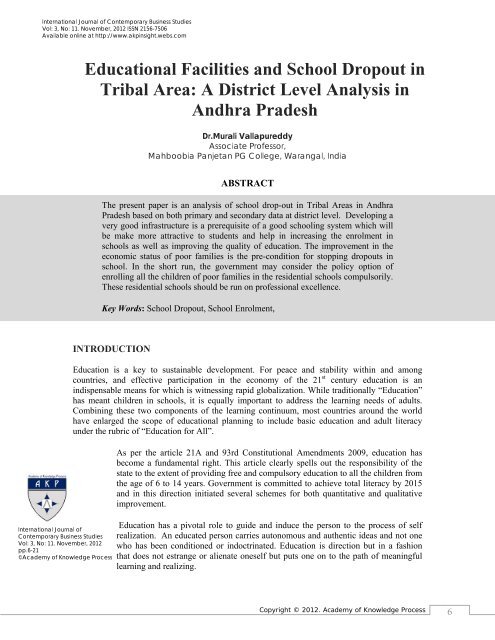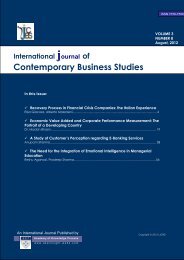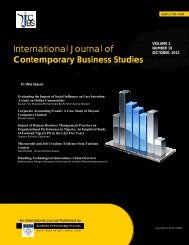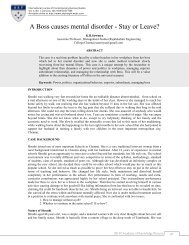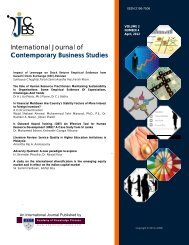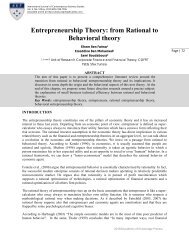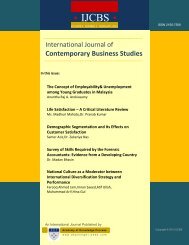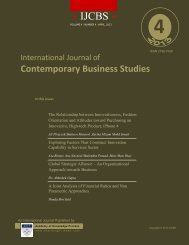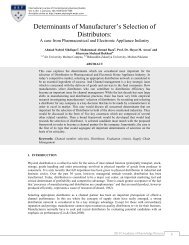International Journal of Contemporary Business Studies
International Journal of Contemporary Business Studies
International Journal of Contemporary Business Studies
You also want an ePaper? Increase the reach of your titles
YUMPU automatically turns print PDFs into web optimized ePapers that Google loves.
<strong>International</strong> <strong>Journal</strong> <strong>of</strong> <strong>Contemporary</strong> <strong>Business</strong> <strong>Studies</strong><br />
Vol: 3, No: 11. November, 2012 ISSN 2156-7506<br />
Available online at http://www.akpinsight.webs.com<br />
Educational Facilities and School Dropout in<br />
Tribal Area: A District Level Analysis in<br />
Andhra Pradesh<br />
Dr.Murali Vallapureddy<br />
Associate Pr<strong>of</strong>essor,<br />
Mahboobia Panjetan PG College, Warangal, India<br />
ABSTRACT<br />
The present paper is an analysis <strong>of</strong> school drop-out in Tribal Areas in Andhra<br />
Pradesh based on both primary and secondary data at district level. Developing a<br />
very good infrastructure is a prerequisite <strong>of</strong> a good schooling system which will<br />
be make more attractive to students and help in increasing the enrolment in<br />
schools as well as improving the quality <strong>of</strong> education. The improvement in the<br />
economic status <strong>of</strong> poor families is the pre-condition for stopping dropouts in<br />
school. In the short run, the government may consider the policy option <strong>of</strong><br />
enrolling all the children <strong>of</strong> poor families in the residential schools compulsorily.<br />
These residential schools should be run on pr<strong>of</strong>essional excellence.<br />
Key Words: School Dropout, School Enrolment,<br />
INTRODUCTION<br />
<strong>International</strong> <strong>Journal</strong> <strong>of</strong><br />
<strong>Contemporary</strong> <strong>Business</strong> <strong>Studies</strong><br />
Vol: 3, No: 11. November, 2012<br />
pp.6-21<br />
©Academy <strong>of</strong> Knowledge Process<br />
Education is a key to sustainable development. For peace and stability within and among<br />
countries, and effective participation in the economy <strong>of</strong> the 21 st century education is an<br />
indispensable means for which is witnessing rapid globalization. While traditionally “Education”<br />
has meant children in schools, it is equally important to address the learning needs <strong>of</strong> adults.<br />
Combining these two components <strong>of</strong> the learning continuum, most countries around the world<br />
have enlarged the scope <strong>of</strong> educational planning to include basic education and adult literacy<br />
under the rubric <strong>of</strong> “Education for All”.<br />
As per the article 21A and 93rd Constitutional Amendments 2009, education has<br />
become a fundamental right. This article clearly spells out the responsibility <strong>of</strong> the<br />
state to the extent <strong>of</strong> providing free and compulsory education to all the children from<br />
the age <strong>of</strong> 6 to 14 years. Government is committed to achieve total literacy by 2015<br />
and in this direction initiated several schemes for both quantitative and qualitative<br />
improvement.<br />
Education has a pivotal role to guide and induce the person to the process <strong>of</strong> self<br />
realization. An educated person carries autonomous and authentic ideas and not one<br />
who has been conditioned or indoctrinated. Education is direction but in a fashion<br />
that does not estrange or alienate oneself but puts one on to the path <strong>of</strong> meaningful<br />
learning and realizing.<br />
Copyright © 2012. Academy <strong>of</strong> Knowledge Process<br />
6


